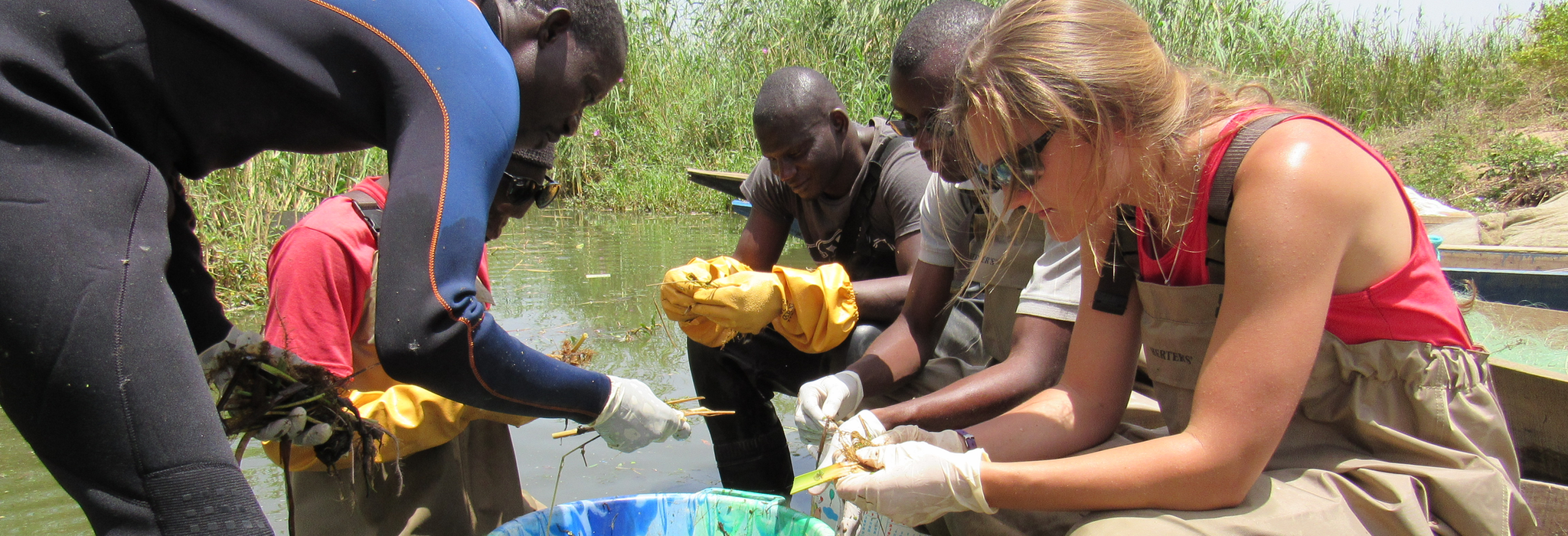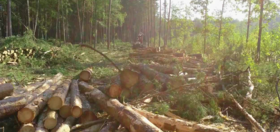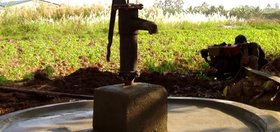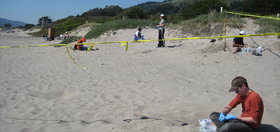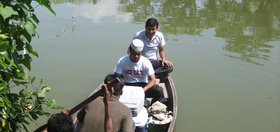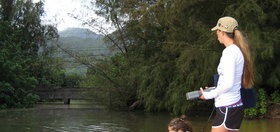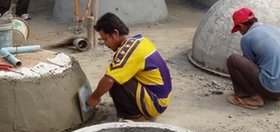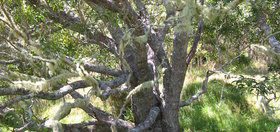Environmental Venture Projects
Promising research needs support to advance transformative environmental and sustainability solutions around the world.
The Stanford Woods Institute has awarded millions of dollars in Environmental Venture Projects (EVP) seed grants to interdisciplinary faculty research teams from all seven of Stanford’s schools and most of its departments. These innovative research projects focus on finding solutions to challenges ranging from the protection of endangered species in California to the delivery of clean drinking water in Africa. EVPs have led to development of natural resources valuation software and biodegradable building materials.
Announcing Our 2023 AwardeesFunded Research News and Features
DEADLINE FOR PROPOSAL: January 17, 2024.
Woods Seed Funding Applications
Contact Brian Sharbono, Woods Institute Associate Director, Programs (sharbono@stanford.edu) for more information.
SEED GRANTS FROM $10,000 to $250,000
The Stanford Woods Institute EVP program provides seed grants from $10,000 to $250,000, for up to two years, for interdisciplinary research projects that seek to identify solutions to pressing problems of the environment and sustainability. Research projects are evaluated for their intellectual merit, potential to solve critical problems, the integration of the disciplinary strengths of the team and the project’s potential to secure additional funding. Additionally, invited proposals will be sent to Stanford's new Ethics and Society Review Board for any ideas and comments for applying PIs to consider regarding the research.
GRANTS UP TO $50,000
Requests for $50,000 or less, for more discrete research needs in line with the priorities and guidelines of the EVP program, are also encouraged. Funds up to this level may also be requested for preliminary activities to support the development of larger projects, for which PIs may apply for an EVP or REIP award in a future round.
ELIGIBILITY
- Each PI (Lead and Co-) must be a member of the Academic Council or Medical Center Line. Please verify that both PI and co-PI are PI eligible.
- Faculty members may only be Lead PI on one EVP application at a time, either for one EVP Small Grant or one EVP Grant, and not both. Likewise a faculty member may not apply for a Woods Institute EVP grant and an REIP grant in the same application cycle. Faculty members are also restricted from being the Lead PI on more than one active grant from the EVP Program or REIP Program.
- However, faculty may be the Lead PI on consecutive grants from the EVP program and/or REIP program. In the case of a consecutive award, a Lead PI applying for a new award will need to have any existing, open grant award from either EVP or REIP set to close, and have the required financial and narrative reports of the current award submitted before the new award can begin.
PROGRAM PRIORITIES
The EVP program seeks projects that:
- Are high-risk, transformative projects that have the potential to produce solutions to major global environmental challenges;
- Represent new interdisciplinary collaborations among faculty who have not previously worked together, with a preference for scholarly communities that have not been active in the Stanford Woods Institute to date; and
- Address cross-cutting issues that are relevant to the environment in general and/or address challenges within one or more of the Stanford Woods’ seven focal areas.
- Examples of cross-cutting issues include: environmental ethics, cultural and humanistic influences, effective economic and incentive systems, environmental justice, political ecology, stewardship, risk perception and analysis, communication, mitigation and adaptation, responses to global changes, valuation, and interdisciplinary modeling.
- Stanford Woods focal areas include: oceans, ecosystem services and conservation, public health, freshwater, climate, food security, and sustainable development.
PROGRAM GUIDELINES
Proposed projects should:
- Represent one or more of the above program priorities;
- Contribute towards a solution to a major global environmental challenge;
- Demonstrate a clear strategy and pathway for connecting your research to an actual solution;
- Involve PIs at Stanford from at least two separate disciplines (For assistance identifying possible co-investigators, please visit the Stanford Woods Institute’s faculty and researchers directory);
- Document how the collaborative effort will be stronger than the sum of disciplinary parts; and
- Have the potential for obtaining future support.
In Focus: Environmental Venture Projects
-
-
April 24, 2024
Images capture science in action and nature’s beauty
Stanford Doerr School of Sustainability -
April 24, 2024
Safer Sunscreen: Stanford researchers explore novel approach to sustainable sun protection
Stanford Woods Institute for the Environment
Projects
2023
- 2023 | Sustainability | South America
- 2023 | Food Security, Sustainability
- 2023 | Oceans | Atlantic Ocean
- 2023 | Public Health | North America
- 2023 | Other, Sustainability
2022
- 2022 | Climate, Public Health | Asia
- 2022 | Public Health | North America
- 2022 | Public Health
- 2022 | Freshwater | North America
- 2022 | Oceans | Antarctica
- 2022 | Freshwater | North America
- 2022 | Climate
- 2022 | Climate
2021
- 2021 | Public Health
- 2021 | Public Health | Asia
- 2021 | Climate
- 2021 | Food Security
- 2021 | Sustainability
- 2021 | Climate
2020
- 2020 | Other
- 2020 | Oceans
- 2020 | Food Security, Oceans | Pacific Ocean
- 2020 | Other
- 2020 | Conservation | Africa, Asia
- 2020 | Food Security | Pacific Ocean
2019
- 2019 | Freshwater | North America
- 2019 | Public Health | Asia
- 2019 | Climate | North America
- 2019 | Public Health | Asia
- 2019 | Climate | Arctic Ocean
2018
- 2018 | Public Health | Africa
- 2018 | Oceans | Atlantic Ocean, Pacific Ocean, Indian Ocean, Arctic Ocean
- 2018 | Climate | North America
- 2018 | Freshwater, Public Health | Africa
- 2018 | Freshwater | Australia
- 2018 | Natural Capital | North America
- 2018 | Freshwater | North America
2017
- 2017 | Other, Sustainability | North America
- 2017 | Public Health | North America
- 2017 | Public Health | Asia
- 2017 | Other | North America
- 2017 | Natural Capital | Asia
- 2017 | Food Security, Sustainability | North America
- 2017 | Other | North America
- 2017 | Oceans, Public Health | North America
2016
- 2016 | Natural Capital | North America
- 2016 | Public Health |Africa, South America
- 2016 | Other | Asia
- 2016 | Climate, Public Health | North America
- 2016 | Climate, Public Health | Asia
2015
- 2015 | Food Security, Oceans | Asia
- 2015 | Oceans | North America
- 2015 | Freshwater | North America
- 2015 | Climate, Food Security | North America
2014
- 2014 | Natural Capital, Public Health | North America
- 2014 | Other, Freshwater, Sustainability | North America
- 2014 | Food Security, Freshwater, Public Health | Asia, North America
- 2014 | Climate, Other, Oceans | North America
2013
- 2013 | Food Security, Oceans | North America
- 2013 | Food Security, Freshwater, Natural Capital, Public Health | Africa, Asia, South America
- 2013 | Food Security, Public Health | Asia
- 2013 | Public Health | No Continent
- 2013 | Oceans | North America
- 2013 | Climate, Sustainability | North America
2012
- 2012 | Freshwater, Natural Capital, Sustainability | North America
- 2012 | Freshwater, Oceans, Sustainability | North America
- 2012 | Freshwater, Public Health | North America
2011
- 2011 | Food Security, Freshwater, Public Health, Sustainability | Africa
- 2011 | Public Health, Sustainability | North America
- 2011 | Oceans | North America
- 2011 | Food Security, Natural Capital, Sustainability | Asia
- 2011 | Natural Capital | South America
- 2011 | Freshwater | North America
- 2011 | Freshwater, Sustainability | Asia
2010
- 2010 | Natural Capital | Africa
- 2010 | Climate, Public Health, Sustainability | Asia
- 2010 | Sustainability | Asia
2009
- 2009 | Climate, Freshwater, Natural Capital | North America
- 2009 | Freshwater, Sustainability | North America
- 2009 | Natural Capital | Australia
2008
- 2008 | Oceans | Pacific Ocean
- 2008 | Natural Capital, Oceans | South America
- 2008 | Food Security, Oceans | South America
- 2008 | Oceans, Public Health | North America
- 2008 | Food Security, Freshwater, Public Health | North America
2007
- 2007 | Oceans | North America
- 2007 | Natural Capital, Public Health | Asia
- 2007 | Oceans, Public Health | Asia
- 2007 | Food Security, Freshwater, Sustainability | Africa
2006
- 2006 | Freshwater | Africa
- 2006 | Freshwater, Natural Capital | North America
- 2006 | Public Health, Sustainability | Asia
- 2006 | Natural Capital | Asia, North America
2005
- 2005 | Climate, Oceans | Africa
- 2005 | Freshwater, Oceans | North America
- 2005 | Natural Capital | North America
- 2005 | Natural Capital | Asia, North America, South America
- 2005 | Freshwater, Sustainability | Asia
- 2005 | Freshwater | North America
2004
- 2004 | Freshwater, Sustainability | North America
- 2004 | Freshwater, Natural Capital, Public Health | Asia
- 2004 | Oceans | North America
- 2004 | Oceans | North America
- 2004 | Natural Capital | North America, South America
- 2004 | Freshwater, Public Health | North America
- 2004 | Food Security, Natural Capital | Asia, Europe, North America
- 2004 | Climate, Oceans | South America
- 2004 | Sustainability | North America

